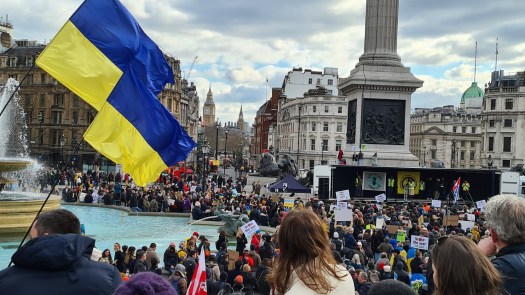“We will remember not the words of our enemies, but the silence of our friends” – Olga Gulaya, facilitator – Kyiv, 6 March 2022.
Better to light a candle than curse the darkness – Amnesty International
The supposed ‘neutrality’ of the facilitator has been something of a bone of contention among facilitators for as long as I can remember. Perhaps because of that contention, the word neutrality does not appear in the Statement of Values and Code of Ethics that all IAF members are required to support, although it does appear in the Core Competencies that all IAF Certified Professional Facilitators are required to demonstrate and evidence.
IAF Statement of Values
As group facilitators, we believe in the inherent value of the individual and the collective wisdom of the group. We strive to help the group make the best use of the contributions of each of its members. We set aside our personal opinions and support the group’s right to make its own choices. We believe that collaborative and cooperative interaction builds consensus and produces meaningful outcomes. We value professional collaboration to improve our profession.
F3. Trust group potential and model neutrality
- Honour the wisdom of the group
- Encourage trust in the capacity and experience of others
- Vigilant to minimise influence on group outcomes
- Maintain an objective, non-defensive, non-judgmental stance
What I think is apparent, notwithstanding competence F3, is that facilitation is not a neutral practice or profession at all. It is not neutral to support some values over others, or some competencies over others. It is not neutral to advocate for facilitation to be “used throughout the world to address the challenges faced by people in their groups, organizations and communities” as the IAF Vision does.
While we “set aside our personal opinions and support the group’s right to make its own choices“, and while “we are vigilant to minimize our influence on group outcomes” and “maintain an objective, non-defensive, non-judgmental stance“, we “believe in the inherent value of the individual and the collective wisdom of the group“, we “do not impose anything that risks the welfare and dignity of the participants” and we “strive to engender an environment of respect and safety where all participants trust that they can speak freely and where individual boundaries are honoured“.
While we must strive to ‘model neutrality’ in respect of the content of the group’s work, in order to be effective in our role as facilitator, we need not and perhaps cannot be neutral to it. We cannot and must not be neutral to the group’s process. We must demonstrate and advocate for respect, equity and inclusion, for dialogue and consensus.
To demonstrate and advocate for the values and competencies that we believe are needed to improve group effectiveness and to address the challenges faced by people around the world, we must stand up for them and we must be seen and heard to stand up for them. That must mean also standing up against those systems and structures of power, discrimination and oppression, violence and war, that deny the inherent value of the individual and the collective wisdom of the group, that risk people’s welfare and dignity and that obstruct or destroy an environment of respect and safety.
As I wrote last September in Reflecting on a year of freelance facilitation online, and looking ahead, “I have been challenged by the Black Lives Matter movement and other recent manifestations and responses to systemic injustice and oppression, and by clients who have been similarly challenged, to reflect on how I might ensure that my own practice is more effectively and explicitly anti-racist, feminist and anti-oppressive, and to commit to working on that.“. That work has already included joining the excellent Feminist Leadership Programme of We Are Feminist Leaders and seeking to ally with others by offering Free facilitation coaching.
More recently I have been shocked and appalled by the unfolding Russian invasion of Ukraine. I have been concerned for the safety and well-being of IAF and ICA colleagues that I have worked with in Ukraine, and more recently in Russia. I have been struggling to know how to respond, knowing that I cannot know what is needed and that anything that I do will not be enough.
I have been awed and inspired by much of the resolve, resistance, solidarity and leadership that I have seen in response to the war. I am grateful to those colleagues in Kyiv who have challenged me this week to realise that every show of support is valued, and that support that is unseen and unheard is no support at all. I am grateful also to those colleagues in Moscow who have shown support and resistance themselves.
I am thankful that ICA colleagues are mobilizing together to show solidarity and support in Standing with the peoples of Ukraine, and that IAF colleagues too are making plans to do so.
Please do whatever little you can to add your support, and to show your support and solidarity. #StandWithUkraine️
I have donated to DEC and local charities recommended by local friends & colleagues, to support refugees and people displaced in Ukraine. Please do whatever little you can to add your support and to show your support and solidarity #StandWithUkraine️ 🇺🇦 https://t.co/lB15isWIEJ
— Martin Gilbraith (@martingilbraith) March 6, 2022
#StopTheWar #StandWithUkraine #StandForPeace pic.twitter.com/6gLCrmBUuF
— Martin Gilbraith (@martingilbraith) March 6, 2022
Friends in Ukraine, you are not alone #PlayForUkraine #PlayForPeace pic.twitter.com/dFTeuHQJBU
— Martin Gilbraith (@martingilbraith) March 6, 2022
I stand in solidarity with Ukrainian civil society organisations who have come together to create the #KyivDeclaration, calling on the international community to respond to six urgent appeals #StandwithUkraine https://t.co/fg3ImJYW1t
— Martin Gilbraith (@martingilbraith) March 7, 2022
I stand in solidarity also with the many Russians and Belorusians bravely protesting and opposing the war in Ukraine 🇺🇦 This is not their war #StandWithUkraine #StandForPeace https://t.co/AjSTXtiRwi
— Martin Gilbraith (@martingilbraith) March 7, 2022
Sign the Petition for the UK to waive visa requirement for Ukrainian refugees #StandWithUkraine️ 🇺🇦 https://t.co/h9DUS3Mm1Q
— Martin Gilbraith (@martingilbraith) March 7, 2022
Could you use some support to engage people responding in solidarity with those suffering from war in #Ukraine, or otherwise to systemic injustice & oppression or toward a just & sustainable world for all? Free #facilitation coaching #StandWithUkraine️ 🇺🇦https://t.co/Gr6JgG7UtZ pic.twitter.com/PBApHW6mRW
— Martin Gilbraith (@martingilbraith) March 7, 2022
#Facilitation friends, we are not neutral – stand up and speak out for what you believe in, as you can & while you can #StandWithUkriane https://t.co/gpFaWLjkv5
— Martin Gilbraith (@martingilbraith) March 11, 2022
See also about me, how I work, who I work with and recommendations & case studies, and please contact me about how we might work together.





